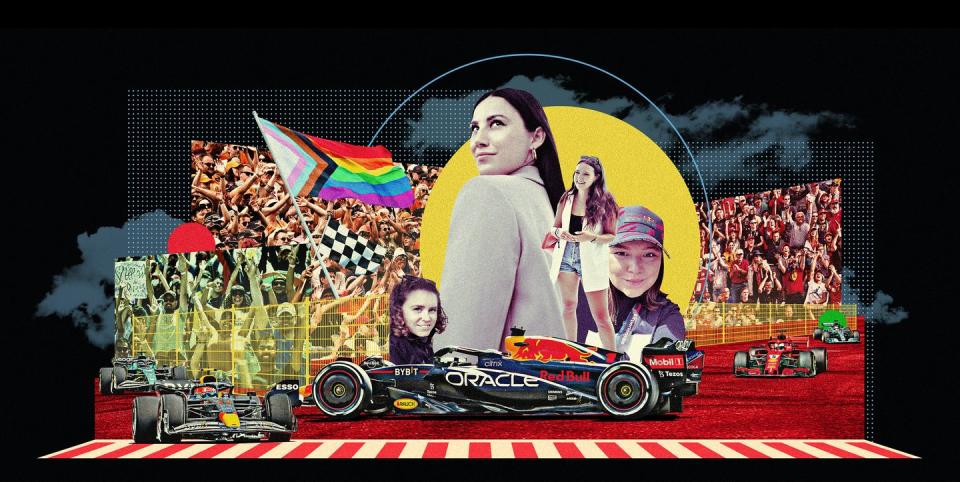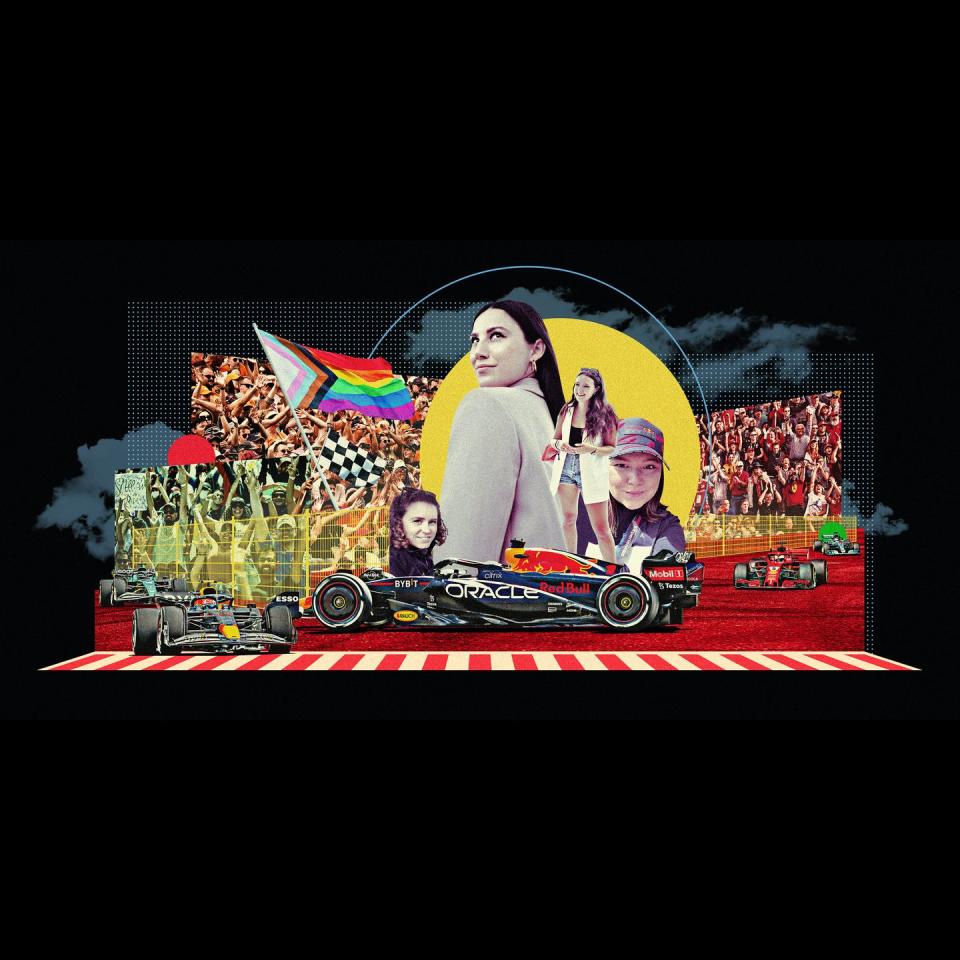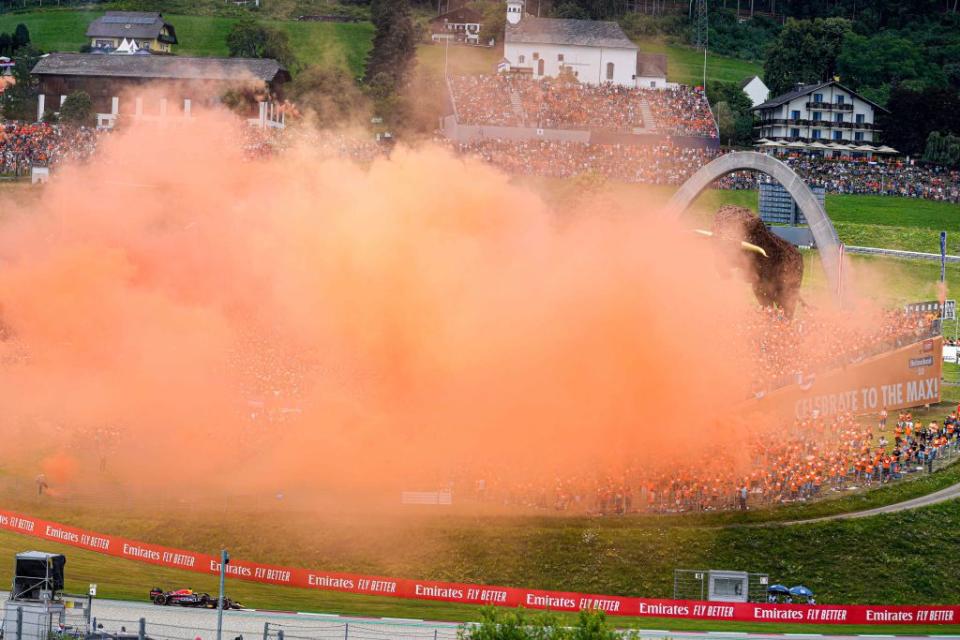The Austrian Grand Prix Was a Nightmare for Female Fans


Lifelong Formula One fan Carleen, a 29-year-old Dutch woman, was so excited when her friends got into the sport as Dutch driver and 2021 champion Max Verstappen rose to fame. She didn’t just have family members to watch races with anymore—she had friends and her partner, too.
Carleen went to the Austrian Grand Prix at the Red Bull Ring this July in a camper with a friend, like many other Dutch fans. It was her first time attending a F1 race. Unfortunately, things went downhill as soon as they parked. Claims of harassment, sexism, racism, and homophobia the weekend of the race lit up social media.
As drivers, reporters, teams, and fans discussed the situation in Austria, Formula One posted a statement on Twitter a few hours before the race:
We have been made aware of reports that some fans have been subject to completely unacceptable comments by others at the Austrian Grand Prix. We take these matters very seriously, have raised them with the promoter and event security, and will be speaking to those who reported the incidents. This kind of behavior is unacceptable and will not be tolerated.
The statement didn’t include ways to report further harassment during or after the race that day.
“I heard from friends that Austria's a really fun place to go, because there's a kind of a party scene there, and there’s a big Dutch crowd,” Carleen said. “I didn't hear about anyone ever having issues before, but there were immediate comments of a sexual nature.
“The first night, we went to do dishes at the sanitary tent. They had this big sink, and there were lots of comments about how we were doing what women should be doing—and men bringing their dishes for us to do, because that's what we're ‘useful’ for. It didn't sink in that this was actually quite traumatic until I got home. We were living on pure adrenaline and in a very stressful situation.”

Carleen said most of her issues happened at the campsite, which was about a 15-minute walk to the grassy hill where she and her friend watched the race. While Carleen didn’t have videos or photos of what happened, she showed Road & Track the emails she’d already sent to both the campsite and Red Bull Ring about her experience.
The emails ran the gamut of what Carleen told me, from sexual harassment to racial slurs.
“All these things are not your fault, but the main thing is, we didn’t feel safe,” she wrote. “We know we won’t be attending next year, but still like to inform you in the hopes of you working on safety for female attendees and women having a better experience next year.”
“I’m very sorry,” a representative for the campsite responded. “Thank you that you shared your thoughts. I will take this into consideration for next year’s planning and will look at how we can create a more women-friendly zone.” A Red Bull Ring employee emailed Carleen to say that improvement is the track’s top priority.
“It was really four days of constant comments,” Carleen told me. “Whistling. But also at night, our camper was pushed. They were knocking on the windows while yelling for us to come outside.
“We tried to speak to some of our neighbors, who were all men, to try getting them on our side. It didn't really work. They just wanted to be with their friends, which is fine. But you get really ramped up and stressed, and every time you need to walk over the campsite, you're ready to fight.”
Carleen said she and her friend didn’t have much trouble in spectator areas, likely because when they arrived at the grassy hill, they chose to sit near security. Even then, she told a track representative via email that she heard men yelling sexual comments at girls young enough to be their daughters, a person hurling a racial slur toward a Black child, and a woman telling a person they couldn’t sit near her on the grass because she “didn't like Chinese people.”

Another fan, Sue, showed me texts she sent her boyfriend on the Saturday before the race. (All spectators quoted in this story asked to go by their first names only to avoid potential online harassment.) They were at the track together, but at one point, Sue left to grab food by herself.
As she waited in line, she texted him: “This makes me uncomfortable without you. A lot of men pushing and in my personal space.”
“I’ll meet you then,” he responded. “Where are you?”
“I’m almost done, so I’ll be fine,” she texted back. “Just messaging you to talk me through it.”
It was truly uncomfortable. “They kept pushing closer and touching my back,” Sue told me. “I would turn around, give them a look, and they would laugh. It continued to happen several times while in that line. That’s when I messaged my boyfriend. I witnessed a lot of drunk men the rest of that day cat-calling women, encroaching in personal space. I was genuinely uncomfortable, and even my boyfriend made comments to me about these drunk men.”
Jessie, a young Dutch woman who attended the race, told me she’s been an F1 fan for a few years now. Her dad always watched it at home, she said, and she joined him one day when she was bored.
“That was the moment I fell in love,” she said. “I support almost every driver, but mainly Max Verstappen. I know that sounds cliché, but it almost feels like betrayal if I would choose anyone else. Red Bull is and will be my favorite team for a long time, but McLaren is a really close second.
“I am the kind of fan who will not make plans if there is a grand prix. You will see me in my Red Bull shirt, jacket, and Max Verstappen hair scrunchy every race weekend. Watching F1 is the highlight of my day—even my weeks sometimes. When I’m bored, I watch old races or the teams’ YouTube channels.”
Jessie got tickets to the Austrian Grand Prix for her 18th birthday, and she went with her father. During the weekend, she messaged an acquaintance about an incident that occurred when she was alone: “Today I was camping, just wearing skinny jeans and a black top. I got whistled after, yelled at by men in their 50s. They shouted at me to come to their tent. When I said I didn’t want to, I was scolded. This was not even at the track, but literally at the campsite.”
“Disgusting!” her acquaintance responded. “So sorry you experienced this. I really don't understand how men don't understand how uncomfortable this is. Do you think it's okay if I share this anonymously on Twitter?”
“If I’d walked with [my father] by my side, it wouldn’t have happened,” Jessie told me while sharing the messages. “That says so much about society.”
Tweets sharing stories like Jessie’s are perhaps the reason we’re talking about this at all. One Twitter user, Melanie Blair, created a thread of posts with people’s claims of harassment during the race weekend. As the thread went viral, people denounced the behavior and posted information on how to safely report it to security and track staff.
Who is in charge of security at the Red Bull Ring?
Hey @F1 @fia @Ben_Sulayem @fiawim @Silbellot @redbull @redbullracing, below are a bunch of tweets about people, particularly women, being harassed at the #AustrianGP this weekend. What can they do to protect themselves? https://t.co/GJiZDT5dgV— Melanie 🏁 (@MotoMel89) July 9, 2022
Social media also created a place for spectators to gather and talk about their experiences during the weekend. Grid Clique, an online community founded and led by motorsport fans Sarah Levenson and Samanta Rose, launched earlier this year with the tagline: “Everyone is welcome.” Levenson and Rose hosted a group chat on the Grid Clique Instagram account for people at Red Bull Ring, and they told me the chat soon morphed from stories of harassment to “members sharing tips, safe spaces to meet up, areas to avoid, and find[ing] new friends to team up with.”
“Most F1 fans might never get to attend a race,” they told me. “They shouldn't be made to feel anxious about attending and engaging. F1 needs to partner with the race promoters to ensure a safe space for everyone in attendance.
“On a local level, this means increased security, safety zones, a phone number or program for reporting issues, and a zero-tolerance policy for negative or derogatory behavior or language across the track. On a macro level, they need to increase the representation of women and nonbinary individuals—normalizing us in the sport as fans and those working at the track and in the organization.”
For Buckley, Jessie, Carleen, and others, the reports of harassment spreading online had an impact on how safe they felt at the race. Carleen shared time-stamped messages from her mother and partner that weekend, both asking in Dutch if she was okay.
“I didn't get any messages from you yesterday,” her partner wrote. “I read all these things about women being harassed there. Are you also experiencing this?”

She said as more people heard about what was happening, more checked up on her—whether they knew her or not.
“A man came to sit with us on the first day,” Carleen told me. “We told him immediately how we felt, and for every single day, like three times a day, he would check up on us. He would come and visit us, or from afar, he would be like: ‘Thumbs up?’ He would bring his friends so they could all check on us, bring us food, and bring us drinks, which was very nice. Some of our male neighbors at the campsite came over too. They had read in the news how it was for women, and they asked us if we were okay, if we needed anything, and if there was anything they could do for us.”
Carleen said action needs to go further than one weekend.
“Everything came out on Sunday, I feel like,” she said. “There were statements made by Formula One and by different drivers and the teams, but that's kind of where it stopped. I feel like we have to keep this train going. There are still so many races to go, and next year, we need to be safe. Not just women, but people of color and people who are in the LGBTQ community. Everyone must be able to enjoy a race, and at this point, we're not.”
Carleen said there are a lot of layers to what happened during the Austrian Grand Prix. The promoters tried to make the environment accommodating, she thinks, but security wasn’t equipped to do that.
“The people who said things were mainly Dutch men between their 40s and 50s,” Carleen said. “One of the things that could be done to make it better for women or people of color is to hire Dutch security who can actually understand the comments being made, so they can take action immediately. I also think alcohol consumption is a big thing, and while I don't agree with it being used as an excuse for bad behavior, it does blur lines.
“But I think also men need to realize that this is not just a men's sport. This is also a female sport. Women can like it too, and maybe one day—I hope to see it in my lifetime—a woman will drive in F1. That would be so cool, and it would give us more ground to be there, even though we already have it.” (Road & Track reached out to the Red Bull Ring to ask about its safety procedures and if the track tries to hire security workers who can speak Dutch, but received no reply.)
I asked Carleen if she still feels the same about F1 as she did before the Austrian Grand Prix weekend. She said she doesn’t. That didn’t just make me sad for her; it made me sad about how common alienation from a sport you love is and will continue to be.
“It's really sad, because it's just someone trying to enjoy the race,” Carleen said. “I was so excited to go see it in real life, and share it with people who feel as passionate as I do. That just didn't really happen.
“I think my enthusiasm will come back, but it might take a little while. I feel very much like [progress] needs to happen, and I want to speak out. But on the other hand, I still feel kind of traumatized and sad about it. I have some healing to do.”
I’ve been there. Maybe you’ve been there, too. None of us deserved it—not me, not you, not Carleen, Jessie, or Sue. Until something changes, we’ll only add more names to that list.
You Might Also Like

 Yahoo Finance
Yahoo Finance 